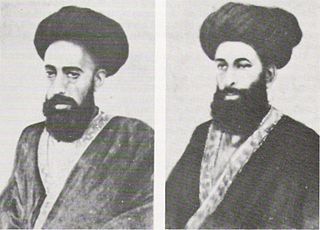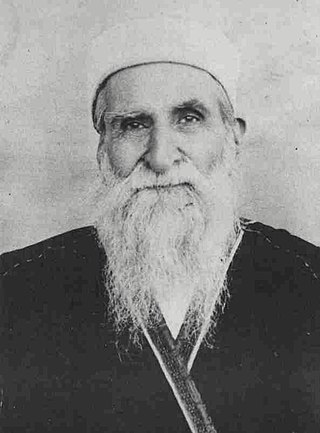Covenant-breaker is a term used in the Baháʼí Faith to refer to a person who has been excommunicated from the Baháʼí community for breaking the Covenant of Baháʼu'lláh, meaning actively promoting schism in the religion or otherwise opposing the legitimacy of the chain of succession of leadership. Excommunication among Baháʼís is rare and not used for transgressions of community standards, intellectual dissent, or conversion to other religions. Instead, it is the most severe punishment, reserved for suppressing organized dissent that threatens the unity of believers.
Badíʻ was an eminent early follower of Baháʼu'lláh, founder of the Baháʼí Faith, and considered one of his chief apostles. At the age of 17 he delivered a letter from Baháʼu'lláh to Náṣiri'd-Dín S͟háh, for which he was tortured and killed.

Mírzá Ḥusayn-i-Isfahání was a prominent Baháʼí and one of the nineteen Apostles of Baháʼu'lláh, as well as a famous calligrapher of 19th-century Persia. He is the author of a calligraphic rendering of the Greatest Name, used by Baháʼís around the world.

Mullá Muḥammad-i-Zarandí, more commonly known as Nabíl-i-Aʻẓam or Nabíl-i-Zarandí, was an eminent Baháʼí historian during the time of Baháʼu'lláh, and one of the nineteen Apostles of Baháʼu'lláh. He is most famous for authoring The Dawn-Breakers, which stands out as one of the most important and extensive accounts of the ministry of the Báb.
Áqá Muḥammad-i-Qá'iní was a distinguished Baháʼí from the town of Qá'in. He is one of 19 Apostles of Baháʼu'lláh, and referred to by ʻAbdu'l-Bahá as a Hand of the Cause of God.
The Apostles of Baháʼu'lláh were nineteen prominent early followers of Baháʼu'lláh, the founder of the Baháʼí Faith. The apostles were designated as such by Shoghi Effendi, head of the religion in the earlier half of the 20th century, and the list was included in The Baháʼí World, Vol. III (pp. 80–81).

Mullá Abu'l-Hasan-i-Ardikání, better known as Hájí Amín, was an eminent follower of Baháʼu'lláh, founder of the Baháʼí Faith. Amín served as the trustee of Huqúqu'lláh, was posthumously appointed a Hand of the Cause of God by Shoghi Effendi, and identified as one of the nineteen Apostles of Baháʼu'lláh.

Afnán-i-Yazdí, also known as Ḥájí Mírzá Muḥammad-Taqí, was an eminent follower of Baháʼu'lláh, the founder of the Baháʼí Faith. He is identified as one of the nineteen Apostles of Baháʼu'lláh.

Núrayn-i-Nayyirayn are two brothers who were followers of Baháʼu'lláh, the founder of the Baháʼí Faith, a global religion of Persian origin. They were beheaded in 1879 as a result of being Baháʼís. Numerous letters and tablets were written in their honour by Baháʼu'lláh, who gave them the titles which they are commonly known as: the King of Martyrs and the Beloved of Martyrs.
Varqá was an eminent follower of Baháʼu'lláh, the founder of the Baháʼí Faith. Varqá was referred to by ʻAbdu'l-Bahá as a Hand of the Cause of God and was identified as one of the nineteen Apostles of Baháʼu'lláh.

Ḥají Mullá ʻAlí-Akbar S͟hahmírzádí, known as Ḥají Ák͟húnd, was an eminent follower of Baháʼu'lláh, the founder of the Baháʼí Faith. He was appointed a Hand of the Cause, and identified as one of the nineteen Apostles of Baháʼu'lláh.

Mírzá Maḥmúd-i-Furúg͟hí, also known as Fádil-i-Furúg͟hí, was an eminent follower of Baháʼu'lláh, the founder of the Baháʼí Faith. He was the only Iranian Baháʼí teacher who was given the chance to meet face to face with a Qajar Shah. He was later identified as one of the nineteen Apostles of Baháʼu'lláh.

Ḥájí Mírzá Muḥammad-Taqí, known as Ibn-i-Abhar, was an eminent follower of Baháʼu'lláh, the founder of the Baháʼí Faith. He was appointed a Hand of the Cause and identified as one of the nineteen Apostles of Baháʼu'lláh.

Mírzá ʻAlí-Muḥammad-i-K͟hurásání, known as Ibn-i-Aṣdaq, was an eminent follower of Baháʼu'lláh, the founder of the Baháʼí Faith. He was appointed a Hand of the Cause and identified as one of the nineteen Apostles of Baháʼu'lláh.

Hájí Mírzá Ḥasan-i-Adíbu'l-ʻUlamá, known as Mírzá Ḥasan or Adíb, was an eminent follower of Baháʼu'lláh, the founder of the Baháʼí Faith. He was appointed a Hand of the Cause and identified as one of the nineteen Apostles of Baháʼu'lláh.
S͟hayk͟h Káẓim-i-Samandar, known as Samandar, was an eminent follower of Baháʼu'lláh, the founder of the Baháʼí Faith. He was born to a prominent Baháʼí family of Qazvin of Bábí and Shaykhi background. Favored by Baháʼu'lláh, he was identified as one of his nineteen Apostles.
Hasan M. Balyuzi was a prominent Iranian member of the Baháʼí Faith. He served in administrative institutions of the religion for decades, worked for the BBC, and was a prolific writer. He produced innumerable articles and a series of scholarly books on Muhammad and the central figures of the Bahá'í dispensation: the Bab, Bahá'u'lláh and 'Abdu'l-Bahá. His consecration to serving the Faith, and his deep spirituality led to his being named a Hand of the Cause in 1957. He established a trust and a library for Bahá'í research and donated his works to it. The library contains more than 10 thousand items and continues to grow.

Mullá Zaynul-ʻÁbidín was a prominent Iranian Baháʼí who served as a secretary to Baháʼu'lláh, was listed by Shoghi Effendi as one of nineteen Apostles of Baháʼu'lláh, and biographied by ʻAbdu'l-Bahá in Memorials of the Faithful. With a background as an Islamic jurist, he posed the clarifying legal questions to Baháʼu'lláh about the Kitáb-i-Aqdas that became the supplement "Questions and Answers" now published along with the original text. His arrangement of the Hidden Words, another major work of Baháʼu'lláh, became the numbered order that is now currently used by Baháʼís.

Mírzá Muḥammad Muṣṭafá al-Baghdádí (1837/8—1910) was a prominent Iraqi adherent of the Baháʼí faith and one of 19 Apostles of Baháʼu'lláh. Mustafá was among the leading Baháʼís in Iraq until he moved to Beirut in the late 1870s, where he coordinated pilgrims going to see Baháʼu'lláh in ʻAkká, and later he was involved with the movement of the Báb's remains to ʻAkká.
Shaykh Muhammad Alíy-i-Qá'iní was the nephew of Nabíl-i-Akbar, another apostle of Baháʼu'lláh. As a young man engaged in religious studies in Mashhad, he encountered the Baháʼí Faith and soon became an ardent believer. He became a close companion of his uncle Nabíl until the latter's death in 1892. In 1903, Shaykh Muhammad Alí was instructed to accompany Mírzá Hasan-i-Adíb to India, but on the he was caught up in the persecution against the Baháʼís in Isfahán. He was stripped of his clothes, severely beaten and fortunate to escape with his life. He had to return to Tihrán, but later reached India and stayed there for a year and a half. He then traveled to Haifa. There ʻAbdu'l-Bahá sent him to Ishqábád to take care of the education of children there. Apart from journeys he made for the service of the faith, he stayed in Ishqábád for the rest of his life. After the death of Mírzá Abu'l-Faḍl, Shaykh Muhammad Alí was called to Haifa to complete, with the help of others, the unfinished writings of Mírzá Abu'l-Faḍl, leaving for Ishqábád shortly before ʻAbdu'l-Bahá's death. Shaykh Muhammad Alí died in 1924 after a prolonged illness.












